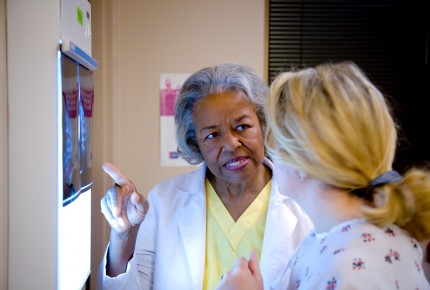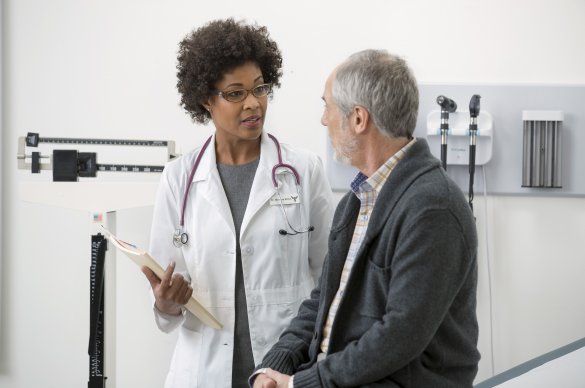Each year, the month of October is dedicated to highlighting the importance of breast cancer awareness, education and research. While this month shines an important spotlight on breast cancer – one of the most commonly diagnosed cancers in the U.S. and the second-leading cause of cancer death in women – ACS CAN takes action year-round to alleviate the tremendous burden that breast cancer places on communities around the country.
In addition to our ongoing work to increase funding for all cancer research, including breast cancer research, we urge lawmakers to increase funding for breast cancer screening and early detection programs for low-income, underinsured and uninsured women. Lack of health insurance poses a significant barrier to accessing timely cancer screening and diagnostic services. Only 31% of uninsured women aged 40 and older have received a mammogram in the past two years, compared to 68% of insured women. We know that in order to reduce breast cancer incidence and mortality, we need to increase access to timely screenings for uninsured and underinsured women.
The National Breast and Cervical Cancer Early Detection Program (NBCCEDP) serves as a lifeline for millions of low-income, uninsured and underinsured women. Since its inception in 1991, the NBCCEDP has provided more than 13.3 million breast and cervical cancer screening exams to more than 5.6 million women. This lifesaving program is severely underfunded at both the state and federal levels, and ACS CAN has prioritized asking Congress to recognize its vital importance by increasing federal funding for the NBCCEDP.
Equally crucial in ensuring all women eligible for the program have access to screening and early detection services is increased state investment in the program – which is why ACS CAN advocates for states to appropriate $1 for every $3 it receives in federal funds for the program. As of this year, 20 states are exceeding that goal, thanks in part to dedicated advocacy from ACS CAN staff and volunteers. Some successes from this year include Colorado Governor Jared Polis renewing the state’s breast and cervical cancer early detection program for another 10 years, and the ACS CAN Texas team successfully advocating for additional funding for the state breast and cervical cancer early detection program, as well as the inclusion of transparency language in the state budget that ensures the Department of State Health Services spends all appropriated funds for the program as intended.
In addition to receiving screening and diagnostic services, women eligible for the NBCCEDP  also have access to comprehensive health care coverage through the state Medicaid program, thanks to federal funding provided by the Breast and Cervical Cancer Treatment Act (BCCT). Recently, some states have considered proposals aimed at eliminating or limiting eligibility for Medicaid, including women eligible for the program through the BCCT option. ACS CAN strongly opposes attempts to limit or eliminate eligibility for the Medicaid program; the ACS CAN Wyoming team had an excellent success this year in response to a proposed reduction in funding for the BCCT option in the state's Medicaid program. The team mobilized its grassroots network of volunteers - many of whom are breast cancer survivors - to urge their lawmakers to vote against the proposed funding cuts. It was the swift, coordinated action by the ACS CAN team that ensured women in their state continue to have access to treatment when they need it most.
also have access to comprehensive health care coverage through the state Medicaid program, thanks to federal funding provided by the Breast and Cervical Cancer Treatment Act (BCCT). Recently, some states have considered proposals aimed at eliminating or limiting eligibility for Medicaid, including women eligible for the program through the BCCT option. ACS CAN strongly opposes attempts to limit or eliminate eligibility for the Medicaid program; the ACS CAN Wyoming team had an excellent success this year in response to a proposed reduction in funding for the BCCT option in the state's Medicaid program. The team mobilized its grassroots network of volunteers - many of whom are breast cancer survivors - to urge their lawmakers to vote against the proposed funding cuts. It was the swift, coordinated action by the ACS CAN team that ensured women in their state continue to have access to treatment when they need it most.
Even as Breast Cancer Awareness Month comes to a close, ACS CAN will keep working year-round, across the country and with both state and federal lawmakers, to advance the public policies we know will reduce the burden of breast cancer.

 also have access to comprehensive health care coverage through the state Medicaid program, thanks to federal funding provided by the Breast and Cervical Cancer Treatment Act (BCCT). Recently, some states have considered proposals aimed at eliminating or limiting eligibility for Medicaid, including women eligible for the program through the BCCT option. ACS CAN strongly opposes attempts to limit or eliminate eligibility for the Medicaid program; the ACS CAN Wyoming team had an excellent success this year in response to a proposed reduction in funding for the BCCT option in the state's Medicaid program. The team mobilized its grassroots network of volunteers - many of whom are breast cancer survivors - to urge their lawmakers to vote against the proposed funding cuts. It was the swift, coordinated action by the ACS CAN team that ensured women in their state continue to have access to treatment when they need it most.
also have access to comprehensive health care coverage through the state Medicaid program, thanks to federal funding provided by the Breast and Cervical Cancer Treatment Act (BCCT). Recently, some states have considered proposals aimed at eliminating or limiting eligibility for Medicaid, including women eligible for the program through the BCCT option. ACS CAN strongly opposes attempts to limit or eliminate eligibility for the Medicaid program; the ACS CAN Wyoming team had an excellent success this year in response to a proposed reduction in funding for the BCCT option in the state's Medicaid program. The team mobilized its grassroots network of volunteers - many of whom are breast cancer survivors - to urge their lawmakers to vote against the proposed funding cuts. It was the swift, coordinated action by the ACS CAN team that ensured women in their state continue to have access to treatment when they need it most.